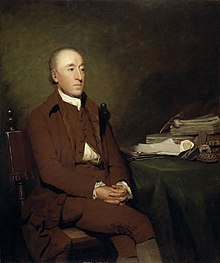
Back جيمس هوتون Arabic جيمس هوتون ARZ Ceyms Hetton Azerbaijani جیمز هاتن AZB Джеймс Хътън Bulgarian James Hutton Catalan James Hutton Czech James Hutton Danish James Hutton German Τζέιμς Χάτον Greek
James Hutton | |
|---|---|
 Portrait by Henry Raeburn, 1776 | |
| Born | 3 June 1726 Edinburgh, Scotland |
| Died | 26 March 1797 (aged 70) Edinburgh, Scotland |
| Alma mater | |
| Known for | |
| Scientific career | |
| Fields | Geology |
| Notes | |
Member of the Royal Society of Agriculture of France | |
James Hutton FRSE ( /ˈhʌtən/; 3 June O.S.[1] 1726 – 26 March 1797) was a Scottish geologist, agriculturalist, chemical manufacturer, naturalist and physician.[2] Often referred to as the "Father of Modern Geology,"[3][4] he played a key role in establishing geology as a modern science.
Hutton advanced the idea that the physical world's remote history can be inferred from evidence in present-day rocks. Through his study of features in the landscape and coastlines of his native Scottish lowlands, such as Salisbury Crags or Siccar Point, he developed the theory that geological features could not be static but underwent continuing transformation over indefinitely long periods of time. From this he argued, in agreement with many other early geologists, that the Earth could not be young. He was one of the earliest proponents of what in the 1830s became known as uniformitarianism, the science which explains features of the Earth's crust as the outcome of continuing natural processes over the long geologic time scale. Hutton also put forward a thesis for a 'system of the habitable Earth' proposed as a deistic mechanism designed to keep the world eternally suitable for humans,[5] an early attempt to formulate what today might be called one kind of anthropic principle.
Some reflections similar to those of Hutton can be found in publications of his contemporaries, such as the French naturalist Georges-Louis Leclerc de Buffon,[5] but it is chiefly Hutton's pioneering work that established the field.[6][7]
- ^ Daly, Sean; Agricola, Georgius (10 May 2018). From the Erzgebirge to Potosi: A History of Geology and Mining Since the 1500's. FriesenPress. ISBN 978-1-5255-1758-7.
- ^ Waterston, Charles D; Macmillan Shearer, A (2006). Former Fellows of the Royal Society of Edinburgh 1783–2002: Biographical Index (PDF). Vol. I. Edinburgh: The Royal Society of Edinburgh. ISBN 978-0-902198-84-5. Archived from the original (PDF) on 19 September 2015. Retrieved 17 July 2012.
- ^ University of Edinburgh. "Millennial Plaques: James Hutton". Hutton's Millennial Plaque, which reads, "In honour of James Hutton 1726–1797 Geologist, chemist, naturalist, father of modern geology, alumnus of the University," is located at the main entrance of the Grant Institute. Archived from the original on 1 November 2007.
- ^ David Denby (11 October 2004). "Northern Lights: How modern life emerged from eighteenth-century Edinburgh". The New Yorker.
In 1770, James Hutton, an experimental farmer and the owner of a sal ammoniac works, began poking into the peculiar shapes and textures of the Salisbury Crags, the looming, irregular rock formations in Edinburgh. Hutton noticed something astonishing—fossilized fish remains embedded in the rock. The remains suggested that volcanic activity had lifted the mass from some depth in the sea. In 1785, he delivered a lecture to the Royal Society of Edinburgh, which included the remarkable statement that "with respect to human observation, this world has neither a beginning nor an end." The book that he eventually published, Theory of the Earth, helped to establish modern geology.
- ^ a b M. J. S. Rudwick (15 October 2014). Earth's Deep History: How It Was Discovered and Why It Matters. University of Chicago Press. pp. 68–70. ISBN 978-0-226-20393-5.
- ^ American Museum of Natural History (2000). "James Hutton: The Founder of Modern Geology". Earth: Inside and Out. Archived from the original on 3 March 2016.
"The result, therefore, of this physical enquiry", Hutton concluded, "is that we find no vestige of a beginning, no prospect of an end".
- ^ Kenneth L. Taylor (September 2006). "Ages in Chaos: James Hutton and the Discovery of Deep Time". The Historian (abstract). Book review of Stephen Baxter. ISBN 0-7653-1238-7. Retrieved 8 April 2017.
© MMXXIII Rich X Search. We shall prevail. All rights reserved. Rich X Search